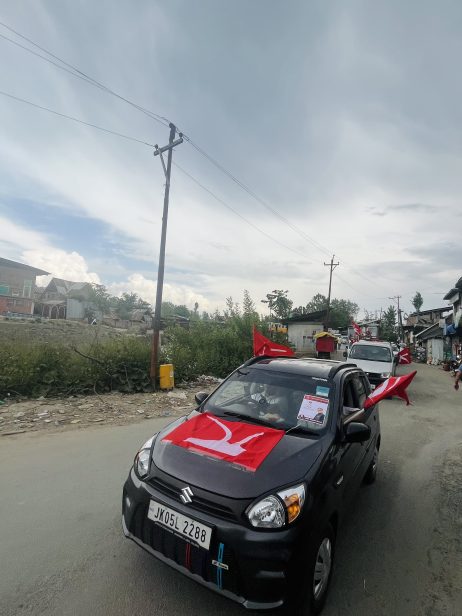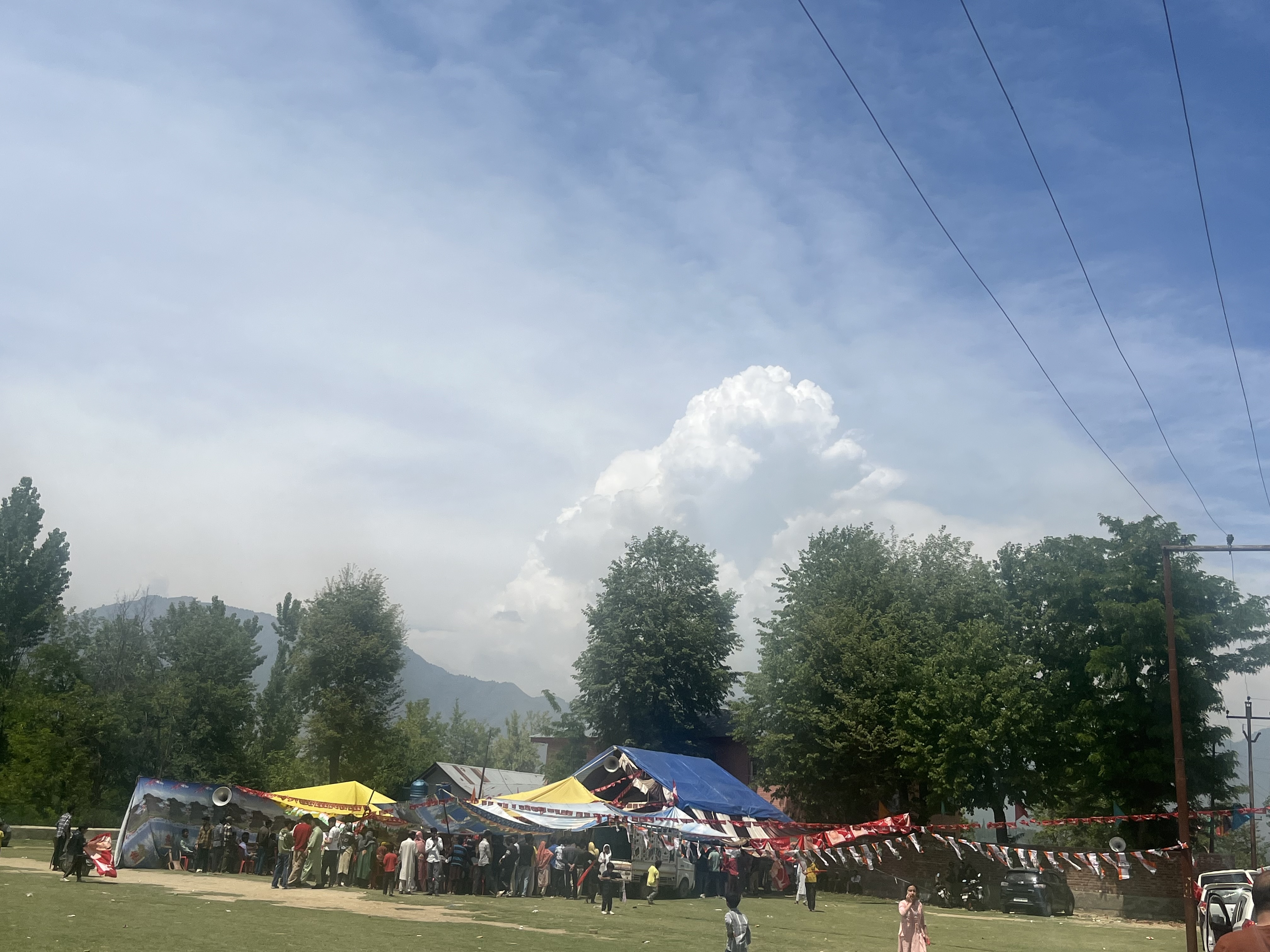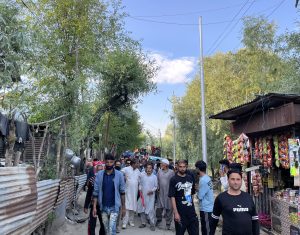There weren’t many elements of a pulsating election rally when National Conference leaders took the podium at Wopzan, roughly 50 km south of Srinagar, the capital of the union territory of Jammu and Kashmir (J&K). In this quiet, picturesque village tucked under the formidable mountain ranges of Bijbehara, there was no throwing of rose blossoms by ebullient party workers. No blaring of slogans on loudspeakers. No blinding emission of light from the equipment of camerapersons hoping to record.
But nearly a thousand people waited patiently to hear the leaders speak. This was an impressive turnout for a small hamlet in Anantnag district, where alienation festers and where polling turnout was just 8.76 percent in the 2019 national elections. The people’s faces conveyed the urgency they attach to the ongoing elections, which are being held to elect the 18th Lok Sabha, India’s lower house of Parliament.
The Kashmir Valley has only three of the total 543 constituencies — Srinagar, Baramulla, and Anantnag-Rajouri. But people described the import of the elections in stark and chilling terms: a demonstration of their anger over the New Delhi-controlled, bureaucratic power apparatus, which is administering J&K in the aftermath of August 5, 2019, when India’s Bharatiya Janata Party (BJP) government revoked J&K’s special status by a presidential proclamation.
The crowd erupted into applause when Bashir Veeri, the NC campaigner, raised his party’s pitch: “Let it be a vote against those who have shut our mosques, taken away our rights and dignity.”
On the sidelines of the public meeting, Veeri told this reporter that the NC has always been at the forefront of the battle against autocracy. “Right from 1931, at the height of the Maharaja’s [Maharaja Hari Singh, the last ruler of the then princely state of J&K] despotic rule, our leaders and workers sacrificed their lives to establish a just and democratic order. When militancy erupted in 1990, Farooq Abdullah [N.C. president and former chief minister of J&K] appealed to the youths to not take up arms, and also made sure elections were held successfully in Kashmir in 1996, leading to violent targeting of our cadre, nearly 5,000 of whom were hunted down by the insurgents,” Veeri recalled.
He emphasized that his party will do everything to prevent the takeover of the Himalayan region by the “BJP’s proxies.”

A roadshow at Mandji village in Sopore, May 18, 2024. This was the first roadshow here in decades. Sopore is known as a separatist stronghold and successive elections have witnessed massive boycotts by the people. Photo by Anando Bhakto
In March 2020, Altaf Bukhari, an affluent businessman and former finance minister of J&K, who was expelled from Mehbooba Mufti’s Peoples Democratic Party (PDP), floated a new political outfit, the Apni Party, breaking away about 40 politicians from the PDP, NC, and the Congress.
The Apni Party and Sajad Lone’s People’s Conference (PC) are widely perceived to be in a clandestine arrangement with Prime Minister Narendra Modi’s BJP. Apparently, the BJP plans to form a coalition government in J&K, together with PC and the Apni Party when the next assembly elections take place in J&K, which was downgraded to a union territory in 2019.
The BJP hopes to sweep the predominantly Hindu Jammu region, while pitting the PC and the Apni Party in the Kashmir Valley against the NC and the PDP, whose combative rhetoric for restoration of the region’s autonomy has riled New Delhi.
India’s Supreme Court has set a September 2024 deadline for holding assembly elections in J&K, and it is imperative for the BJP to boost the prospects of its alleged proxies in the ongoing parliamentary elections to launch them as front-runners for the assembly elections. Both the PC and the Apni Party refute allegations that they have any liaisons with the BJP.
The BJP itself is not fielding any candidates in the three constituencies of the Kashmir Valley.
The last assembly elections in J&K were held in 2014, culminating in a PDP-BJP coalition government, which collapsed in June 2018 when the BJP withdrew support to Mehbooba Mufti, chief minister at the time. J&K has since been administered by New Delhi-appointed governors.
Omar Abdullah of the NC, a former chief minister who is contesting against Sajad Lone in Baramulla, recently cautioned voters that although the “BJP symbol won’t be on the [electronic voting] machine, it’s very much part of Kashmir’s electoral process.”
An interaction with a cross-section of voters in Sopore, Bandipora, Anantnag, and Kulgam districts gave the sense that Abdullah’s message resonated with a plurality of the electorates, who are determined to defeat what they perceive as the BJP’s proxies. Mohammad Yousuf Tarigami, a senior Kashmiri leader from the Communist Party of India (Marxist), shared his excitement over holding a well-attended rally at Bugam village in Kulgam, which had been out-of-bounds for mainstream politicians for decades.
“People’s brisk participation in my recent public meeting at Bugam reminded me of the 1979 rally helmed by veteran communist leader Harkishan Singh Surjeet, who had come here ahead of the 1980 general elections. It was massive,” Tarigami reminisced. “But as Kashmir’s political stability began to waver in the late 1980s, it was an uphill task to mobilize people in Bugam. But not any longer.”
Voter footfall in the first two rounds of the elections in Kashmir has been phenomenal. On May 13, the Srinagar constituency witnessed a 38 percent turnout, up from 14.43 percent in the 2019 national elections. On May 20, the Baramulla constituency witnessed roughly 59 percent turnout, the highest since the 1984 national elections. Anantnag-Rajouri will vote on May 25.
A section of the pro-government media is on an overdrive to frame the voter surge as Kashmiris’ stamp of approval for the unilateral abrogation of its special status. People on the ground reject that specious argument. They say they are drawn to the polling stations with only one objective in mind: To ensure that the BJP’s preferred candidates do not win.
In Sopore, Aaqib, a teacher in his late 20s, averred: “We vote to reverse everything that August 5, 2019, effected in our lives: stifling of dissenting viewpoints by relentless use of anti-terror laws, an affront to our religious sentiments, and the fear of a demographic reorientation.” His companions share his vexation that the world around them is crumbling under the strain of the BJP’s Hindu majoritarian politics. Their vote is their instrument to convey their accumulated anger and loss of hope.
Since 2019, New Delhi has perfected a model of repression in Kashmir that aims at erasing civilian dissent in all its forms. There seems to be censorship on how Kashmiris would even think or emote over events unfolding around them.
During the November 2023 ICC World Cup finals between India and Australia, seven Kashmiri students studying at the Sher-e-Kashmir University of Agricultural Sciences and Technology in Ganderbal district were booked under the Unlawful Activities (Prevention) Act for allegedly cheering for the winning Australian team.
According to a media report, 57 government employees have been sacked in the past two years for allegedly supporting militant activities. Since 2016, Eid congregational prayers have not been allowed at the historic Eidgah in Srinagar. The Mirwaiz (chief cleric) of Kashmir, Umar Farooq, has been under house arrest for close to five years now. In what is being seen as a bid to dilute Kashmir’s Islamic identity, prominent public places and institutions are being renamed after Hindutva ideologues. The Chenani-Nashri tunnel has been renamed as Dr. Syama Prasad Mookerjee Tunnel, for instance.
The government’s decision to relax the norms for acquiring a domicile certificate has thrown open opportunities for non-locals to work and buy properties in Kashmir. An overwhelming section of the Kashmiri populace fears this is a design to effect a non-local influx into the valley to alter the region’s largely Muslim demographic composition.
At Behibagh village in Kulgam, people shared their resolve to elect candidates who would arrest Kashmir’s authoritarian makeover. Sameer, a tea vendor near the Mughal restaurant, explained, “We need our own representatives. People who will be accessible to us and defend us against coercive police action.” According to him, Mufti’s PDP and the Abdullah’s NC are witnessing an outpouring of public support.
His voice fell to whisper at the sight of a Central Reserve Police Force personnel. “We are scared of talking to the media. Who knows we will be picked up tomorrow,” he said.
Until recently, the NC and the PDP were constituents of the People’s Alliance for Gupkar Declaration (PAGD), an amalgam of Kashmir’s political parties that advocate the restoration of the special status. But the inability to chalk out a seat-sharing formula for the ongoing national elections saw the PAGD collapsing. The two parties are contesting against each other in all three parliamentary seats, majorly fragmenting the anti-establishment votes and weakening the struggle to reverse the clock to August 4, 2019.
Imran Dar, spokesperson of the NC, voiced his party’s commitment to pursue a politics that accords primacy to the people’s aspirations and sentiments. “The PAGD and its objectives stand. Our resolve to collectively work for the restoration of the status quo of pre-August 5, 2019 stands,” he said.
He argued that it was the PDP that “abandoned the people’s cause by deciding to contest against NC’s incumbent parliamentarians” — the NC had won all three Kashmir valley seats in 2019. Dar said that the party had “weakened the common voice” the NC was trying to set out from Kashmir, which is that “people here unanimously reject the political incursions of New Delhi.”
The PDP maintains it was willing to take a back seat, but the NC’s pugnacious public promotion of its predominant role in Kashmiri politics was too much for it to bear.
Baramulla constituency witnessed a sudden surge of public support for jailed candidate Abdul Rashid Sheikh, popularly known as “Engineer Rashid.” In 2019, Rashid, who heads the Awami Ittehad Party, was detained by the National Investigative Agency and charged under the UAPA in a terror-funding case. He has since been languishing at Delhi’s Tihar jail. His elder son, Abrar, is energetically canvassing for him, attracting a sea of supporters across North Kashmir who attach a halo of sainthood to Rashid.
At Dastagiri hotel in Sopore, two helpers, Sahil and Bilal, said they would vote for Engineer Rashid. “He is in jail because unlike the other politicians, he did not compromise. We have never voted before, but this time we will vote for him as a mark of gratitude,” they said.
However, their guest, Ghulam Qadir, who is a clothes merchant, differs. According to him, NC leader Abdullah, who is contesting from Baramulla, can “help us navigate the present complex circumstances.” He gravitated towards the words “calm” and “collected” when talking about Abdullah, and said that “Kashmir needs his discerning leadership.”
Qadir is afraid Engineer Rashid’s candidature may have scuppered Abdullah’s prospects. In the 2019 national elections in Baramulla constituency, Rashid had polled 102,168 votes, not far behind Akbar Lone, the then-NC candidate who won with 130,000 votes. However, a closer inspection of voter sentiment and campaign trends of the three main candidates suggests that Abdullah would sail through when the ballots are counted on June 4.

A National Conference rally at Wopzan in Bijbehara, J&K’s Anantnag district, India, May 19, 2024. Photo by Anando Bhakto.
As the elections attain a feverish pitch in Kashmir, several machinations are at work. On May 16, Minister for Home Affairs Amit Shah of the BJP made a surprise appearance in Srinagar. His meetings with several delegations from Gujjar, Bakerwal, Pahari, and Sikh communities spurred talk that he may be clandestinely soliciting support for Lone in Baramulla constituency and the Apni Party candidate in Anantnag-Rajouri, Zaffar Iqbal. Despite the Modi government according Scheduled Tribe status to Paharis, who are concentrated in Rajouri-Poonch, the community is said to be supporting Mufti, who has made impassioned pleas against the Modi government’s communally divisive agendas and outlined the importance of bilateral talks with Pakistan. Mufti is the PDP candidate in Anantnag-Rajouri.
Shah’s visit, sources in New Delhi’s political establishment indicate, was aimed at nudging the Pahari community to vote for Iqbal, and wreck Mufti’s attempts to map out a political rebound.
The BJP is also preparing the pitch for assembly elections, urging people to reject the dynastic politics of the Abdullahs and the Muftis, and look at it as a plausible alternative.
The Modi regime claims it has brought proposals of investments to the tune of $10.16 billion in J&K. But the abject poverty in villages such as Ghat Gopalan in Baramulla district spurs skepticism. The villagers in Ghat Gopalan grow fruits in unauthorized lands, and 50 percent of their profits are earmarked for the government.
Ghulam Mohammad Khuroo, a local, said his immediate concern was flooding and no means of public transportation to the school where his children study. His experiences are an illustration of the aloof, inaccessible character of Kashmir’s bureaucratic regime.

































